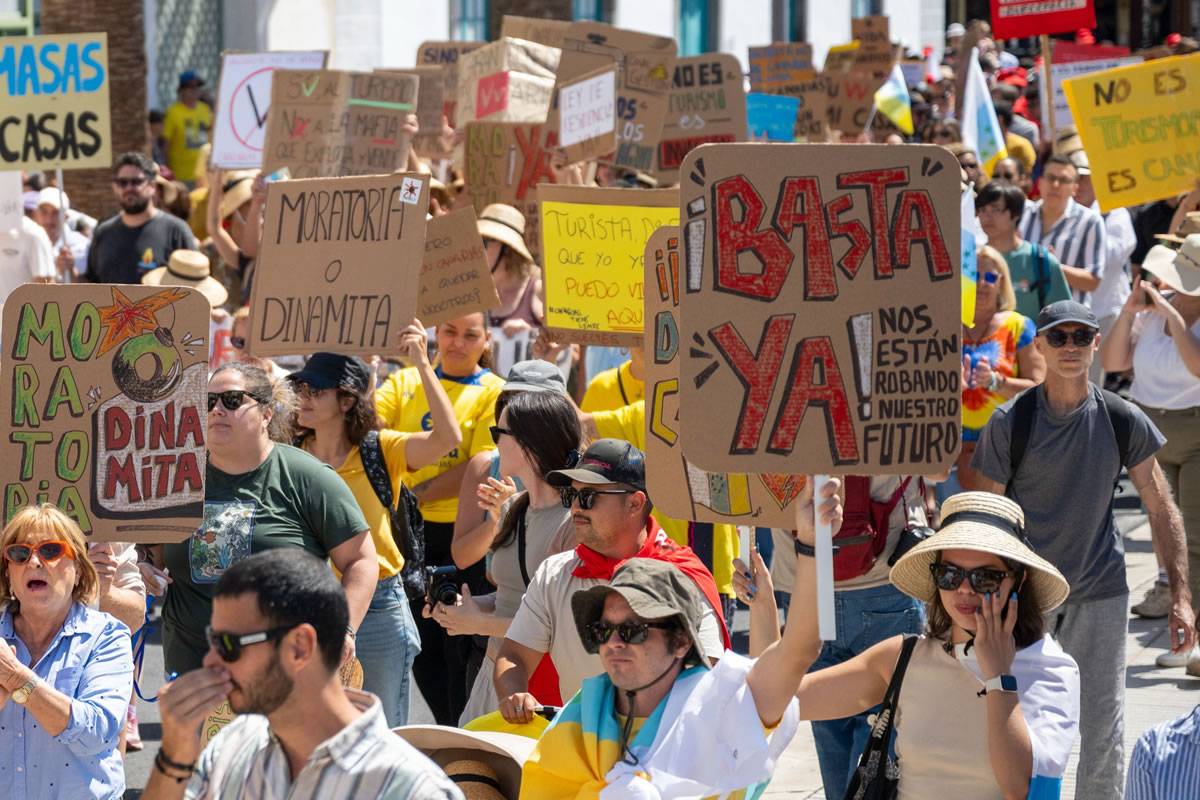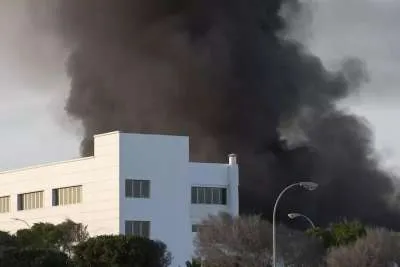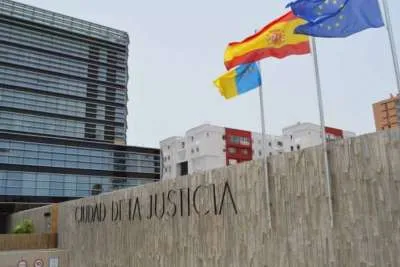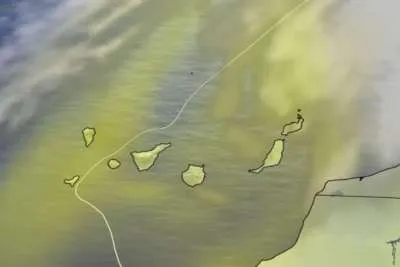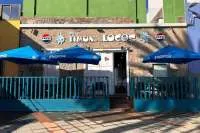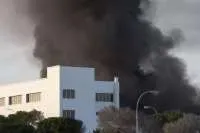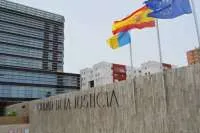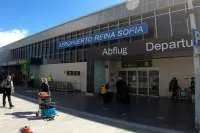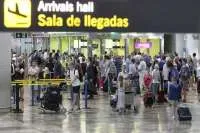30,000 protest against mass tourism and new hotel projects in the Canary Islands
- 19-05-2025
- National
- Canarian Weekly
- Photo Credit: Efe
Around 30,000 people took to the streets across the Canary Islands yesterday, Sunday, in a coordinated wave of protests against mass tourism, demanding urgent action to protect the region’s natural resources and to improve housing and the quality of life for residents.
Under the banner “Canarias tiene un límite” (“The Canary Islands Have a Limit”), demonstrators called for a tourism model that is more sustainable and responsive to the archipelago’s environmental and social constraints. The protests, the third major mobilisation of this kind, were held simultaneously in all of the islands at 11:00am.
According to figures from the Government Delegation, 23,190 people participated, including 15,000 in Tenerife alone (although police reported 9,000), 5,000 in Gran Canaria, and smaller gatherings in Lanzarote (2,000), La Palma (500), Fuerteventura (500), La Gomera (100), and El Hierro (90). The organisers, however, claim that more than 90,000 people took part overall, including 300 in Madrid.
“Tourism leaders, poverty leaders”
Placards at the Tenerife march read: “Tourism leaders, poverty leaders: Europe’s slaves”, “Wake up — we’re fighting for our future”, and “For clean seas, stop sewage discharges.” The rallies were fuelled by frustration over unchecked urban development, pollution, and a lack of government action despite previous mass demonstrations in 2024.
Activist Helena Espinosa, from the environmental group ATAN, said: “We’re not against tourism, we’re against uncontrolled tourism. We’re receiving 18 million tourists a year, and there’s still no limit. Our islands are overwhelmed.”
Documentary filmmaker Felipe Ravina warned that illegal construction projects are still going ahead, while “limits on tourism and population growth” remain absent. “In the past 20 years, the population has grown by 600,000 people, and we simply don’t have the land or resources to support this indefinitely,” he said.
Calls for reform, not promotion
Protesters called for a halt to all illegal and destructive developments, a real hotel and holiday rental moratorium, and stronger protections for the natural environment. Key demands included a law on residency to control speculative real estate, a tourist tax to fund conservation, the restoration of ecosystems, and a ban on sewage discharges into the sea.
They also urged an end to large-scale infrastructure projects such as road expansions, ports, airports, and trains that they argue contradict the island’s environmental goals. Organisers stressed the need for food and energy sovereignty and greater respect for local communities.
Solidarity across Spain and Europe
Solidarity protests were also held in major cities, including Madrid, Barcelona, Valencia, Bilbao, and Berlin. In Madrid’s Puerta del Sol, nearly 100 demonstrators wore yellow shirts and waved Canarian flags in a symbolic protest. “We want to amplify the voices of those in the Canaries who are being displaced, priced out, and ignored,” said Javier Cruz from Diáspora Canaria.
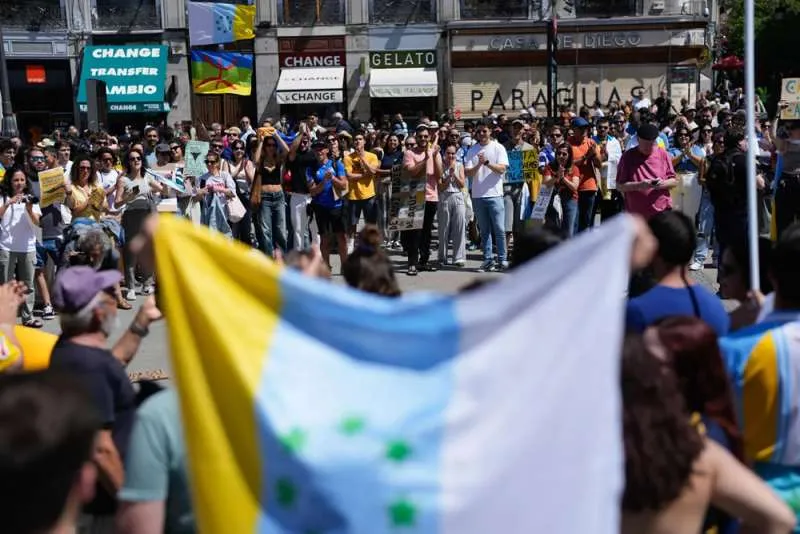
Fiorela, a young protester, criticised the imbalance in land use: “There are towns where tourist zoning outnumbers residential land. People are being pushed out. Rent costs €1,000, and tenants are evicted in summer to make way for holiday lets. It’s happening here, and in the Balearics too.”
Canary Islands reach breaking point
In Santa Cruz de Tenerife, protestors marched from Plaza Weyler, holding images of artist César Manrique alongside visuals of polluted beaches. “We’re calling for an end to destructive urban mega-projects that are wiping out fragile coastal areas,” said Rubén Pérez from Salvar La Tejita, referring to developments in El Médano and Puertito de Adeje.
In Las Palmas, marchers demanded the cancellation of controversial projects like the Chira-Soria hydroelectric plant and the La Atalaya biogas facility, initiatives they believe are incompatible with a truly ecological island.
Speaking on behalf of Ben Magec–Ecologistas en Acción, Noelia Sánchez criticised the regional government and tourism industry for “minimising the impact of overtourism, environmental degradation, and the growing housing crisis.”
The message from the protesters was clear: the Canary Islands are at a tipping point, and unless bold action is taken, the consequences will be irreversible.
Other articles that may interest you...
Trending
Most Read Articles
Featured Videos
TributoFest: Michael Buble promo 14.02.2026
- 30-01-2026
TEAs 2025 Highlights
- 17-11-2025


